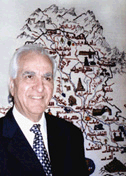Rivers as a tourist connection among countries
A few days before publishing issue 42 of our Islamic Tourism Magazine I paid a visit to my family in Iraq where I undertook a tour of several cities, including Baghdad, which reminded me of the Tigris and the Euphrates rivers which flow through Iraq and its various valleys. The two rivers are still there, great as they always were, and flowing throughout the year. And yet, they're getting worse every day - treasures from God - but now so much is preventing us from reaping our treasures. I was very depressed because I live on an island located in the middle of the River Thames that is famous throughout the world for its history, its culture and its amazing variety of wildlife, archaeology and scenery. If you ask a Londoner or the thousands of boaters in cruisers up and down the length of the river, what is the City's greatest asset, they will come up with a myriad of reasons why a day on or near the Thames is a great experience. For instance, its canals are used by walkers and anglers, by boaters, cyclists and wildlife enthusiasts. They are also vital for the transference of water from different parts of the country. I tried to draw analogies between the British model and the al-Baghdadi model. One can easily perceive the major differences between the British and European utilization of their rivers in the sector of tourism whereas we Arab countries neglect our rivers in Iraq (and possibly in other Arab countries), and along the track that comes across the Arab States, particularly Turkey, Syria, Iran and others. This has been already covered in an article about the importance of rivers in the tourism sector in issue 8 of our magazine that has shown the potential benefits that could occur in countries if due care and scientific capabilities focused on the construction of dams and the removal of silt from the underground rivers, to enable all means of transportation to move through them easily and smoothly. No doubt, these previously mentioned huge projects are no less important than reconstructing cities and countries comparable to many other projects such as highways development. I do not call for a focus on the infrastructure of the rivers at the expense of other projects, but I call to give them due care and should be taken into consideration.
Now, the question is why should rivers be given exaggerated importance? The answer is simply because of the benefit to all: the lands, the trees, the birds and bricks, the countries and its people.
God willing, many of these examples of benefits will be included in the coming issues.
To conclude this article, my appeal is directed to all whom it may concern to care about all rivers in the countries facilitating their movement up and down such areas. Moreover we hope the flowing of rivers in Iraq, the rivers which are gradually being destroyed, and there are no projects to prevent their destruction, possibly by FAO up to the headwaters of the Tigris and Euphrates rivers , and vice versa across the boats and the various means of river transport and thus survive and flourish on both river banks. The best example to be tackled here on this issue is the Danube River, which flows through several European countries as well as the rest of the rivers in Europe. It's a wish to achieve these strong ties among the countries of the region and to be a common source of these rivers. Continue to get acquainted with them and reach agreement rather than discord and competition. Finally, I have included some pictures which may be more reflective of what is written and read on the subject of the importance of rivers in all fields of life, especially human relations. These pictures were taken on 25 April 2009, which depict the area where I live. The exhibition which was near a dam was also near one of the locks. Many of the boats maintain the high level of river for various reasons and benefits as stated earlier. The title of the exhibition is the prevention of flooding of buildings and installations, and this activity reflects the face of industrial, scientific and technical handling, control and prevention of flooding in various ways and products as well as the dissemination of knowledge and cultural awareness to the public on the subject. This is one of the hundreds of river-related economic activities, infrastructure and related services. The matter is being urgently considered since the Tigris and Euphrates are regarded as among Iraq's treasures, and we must safeguard our treasures.
May God guide us to success.
|

